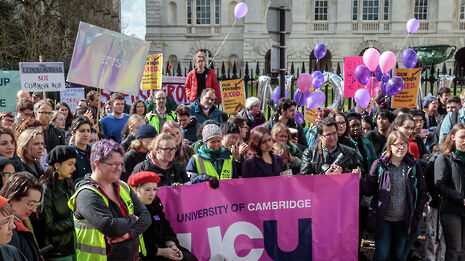Cambridge UCU challenges national leadership’s ‘threat to democracy’
Cambridge’s branch of the employees’ union took its first official stance against national leadership in an ongoing trade dispute

Cambridge University and College Union (UCU) resolved today to call on national leadership to open itself up to scrutiny by its membership, marking its first official stance in the national controversy which has hit the employees’ union in the past two weeks.
At an open meeting for UCU members in Mill Lane today, the majority of those present passed two motions challenging UCU national leadership.
The first motion, which passed with 23 votes in favour, called on General Secretary Sally Hunt to make a statement to members “affirming that she respects the sovereignty of Congress”, emphasising her role as an elected representative in being held accountable for her actions by UCU members.
The motion demanded that Hunt “condemn the disruption to the democratic process of Congress”, in light of a walkout during Congress which it said “prevented the discussion of motions critical of her actions during the USS dispute”.
The second motion, passed with the support of 29 members, stated that the Cambridge UCU branch believes that “events leading to the early closing of Congress represent a threat to democracy in the Union and a denial of the will of its members”. The branch therefore resolved to “call for Congress to be recalled by July 2018 at the latest”, and to instruct Cambridge delegates to vote in favour of debating motions critical of Hunt.
Today’s meeting comes amid widespread internal conflict in the employees’ union, plunging it into a trade dispute.
Between 30th March and 1st June, delegates from UCU branches across the country met in Manchester for the union’s annual policy-making Congress, only for it to end in a walkout and impasse. Letters distributed to delegates by Unite – the UK’s largest trade union – said that the General Secretary, as a paid member of union staff, should not be targeted by Congress motions that “constituted a form of disciplinary action without due process and in contravention of her employment rights”.
Sally Hunt, UCU General Secretary, has remained in her position despite calls for her to resign. Two motions, ten and 11, were aimed at Hunt: one called for a vote of no confidence, and the other called for censure, an expression of disapproval at her actions.
Hunt has been heavily criticised by some national UCU delegates for accepting a Universities UK motion which called for an end to the staff pensions strike in March, by putting it to a member vote, despite not having taken a ballot of the national branches.
The motion said that Hunt had claimed “a majority of branches supported taking the unamended proposal to a membership ballot despite refusing to allow a vote on such a measure”, which was “representative of a democratic deficit in the union”, and a “continuous pattern of unilateral, undemocratic action by the national leadership”
 Comment / College rivalry should not become college snobbery30 January 2026
Comment / College rivalry should not become college snobbery30 January 2026 News / Downing Bar dodges college takeover31 January 2026
News / Downing Bar dodges college takeover31 January 2026 News / Cambridge for Palestine hosts sit-in at Sidgwick demanding divestment31 January 2026
News / Cambridge for Palestine hosts sit-in at Sidgwick demanding divestment31 January 2026 Science / Meet the Cambridge physicist who advocates for the humanities30 January 2026
Science / Meet the Cambridge physicist who advocates for the humanities30 January 2026 Lifestyle / Which Cambridge eatery are you?1 February 2026
Lifestyle / Which Cambridge eatery are you?1 February 2026










